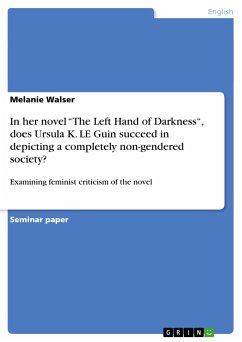
In her novel "The Left Hand of Darkness", does Ursula K. LE Guin succeed in depicting a completely non-gendered society?
Examining feminist criticism of the novel

PAYBACK Punkte
0 °P sammeln!
Seminar paper from the year 2007 in the subject American Studies - Literature, grade: 1,5, Free University of Berlin (John F. Kennedy-Institut für Nordamerikastudien), course: The Literature of the Sixties, language: English, abstract: This paper will go into certain aspects of feminist criticisms of Ursula K. Le Guin's 1969 science fiction novel "The Left Hand of Darkness", discuss their justification question, and further examine the consistency of Le Guin's description of the genderless society of Gethen. The Left Hand of Darkness tells the story of Genly Ai, an envoy from Earth ("Terra"),...
Seminar paper from the year 2007 in the subject American Studies - Literature, grade: 1,5, Free University of Berlin (John F. Kennedy-Institut für Nordamerikastudien), course: The Literature of the Sixties, language: English, abstract: This paper will go into certain aspects of feminist criticisms of Ursula K. Le Guin's 1969 science fiction novel "The Left Hand of Darkness", discuss their justification question, and further examine the consistency of Le Guin's description of the genderless society of Gethen. The Left Hand of Darkness tells the story of Genly Ai, an envoy from Earth ("Terra"), sent by the "Ekumen", a union of inhabited planets, to planet Gethen in order to convince the planet's inhabitants to join an interstellar alliance. Throughout the novel Le Guin explores Genly Ai's difficulties to understand and become part of society on Gethen, which are mainly due to the fact that all the inhabitants are ambisexual; they only take on a biological gender once a month, in a short period of sexual activity. Each individual has the capacity to become either a man or a woman, and their sex can differ from one month to the other. The Left Hand of Darkness has played an essential role in the history of science fiction. Since Science Fiction was a largely male dominated field of literature in the 1960s, both in its authors and its protagonists, Le Guin's novel was pathbreaking in many ways. It has attracted a lot of attention for its unusual focus on social science and human relationships as opposed to natural science and technology and for its attempt to show a society of complete equals. However, Le Guins thought-experiment about a genderless or gender-ambiguous society has frequently been subject to harsh criticism by feminist critics, who hold that she has not succeeded to create a credible picture of this society. They claim the gender situation throughout the book to be inconsistent. According to these critics, instead of depicting a society without any gender roles, Le Guin describes a purely male world, and fails to make the reader see the Gethenians as women as well as men. This paper discusses the validity of these criticisms.













